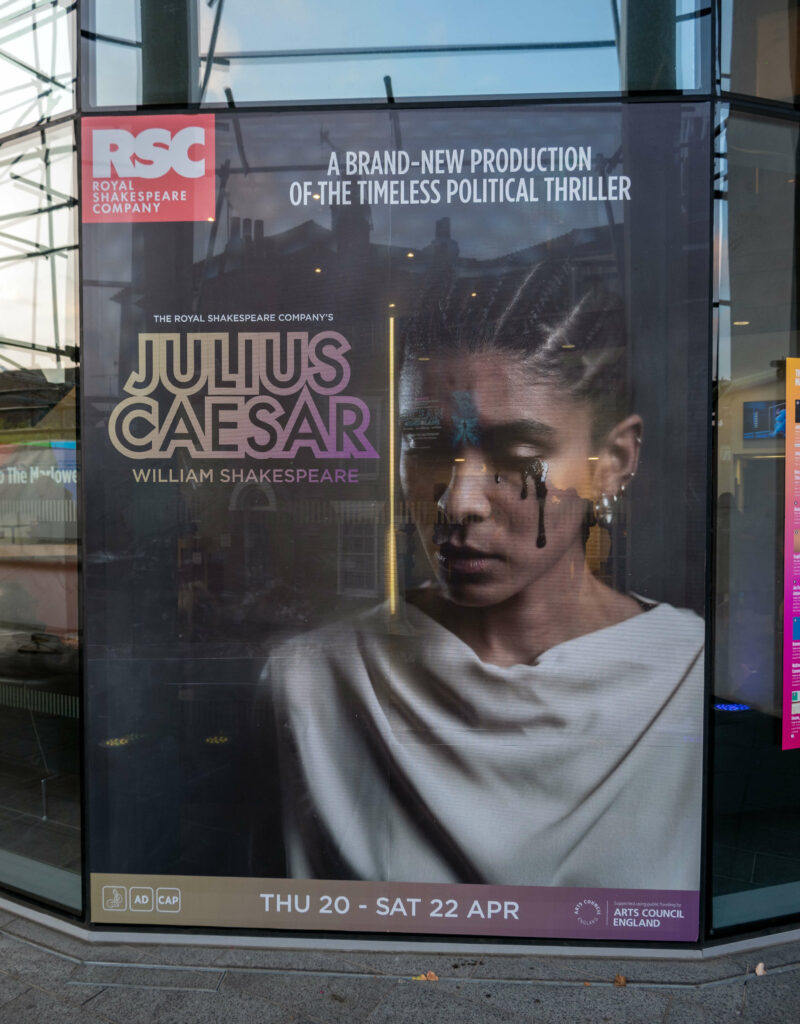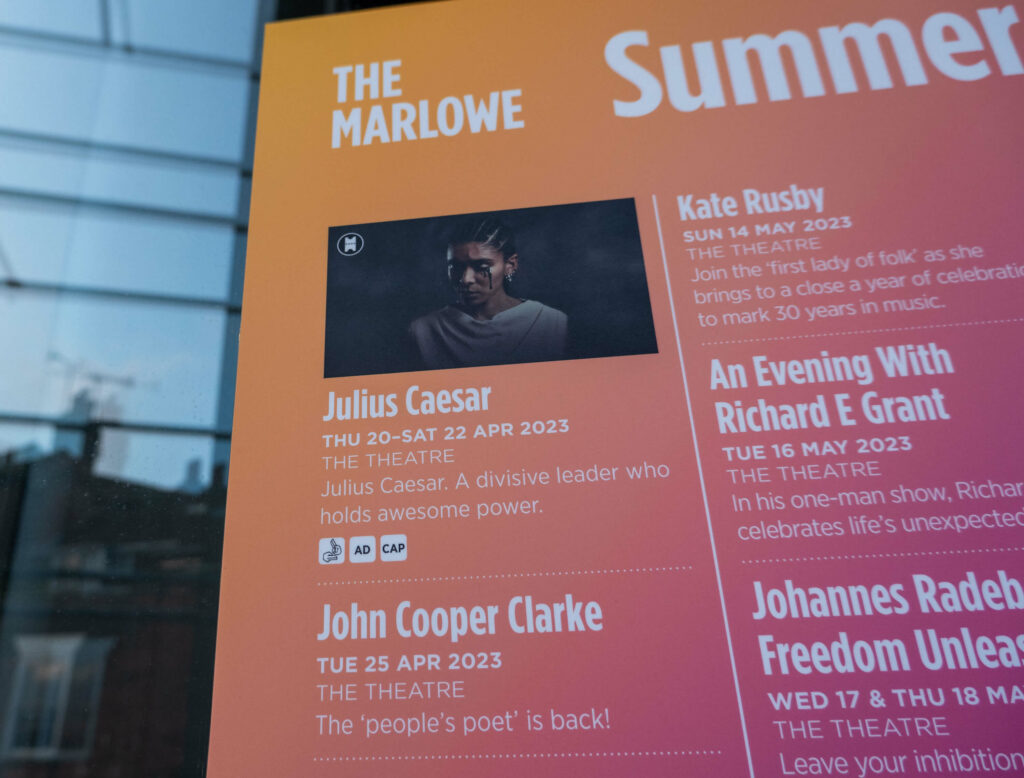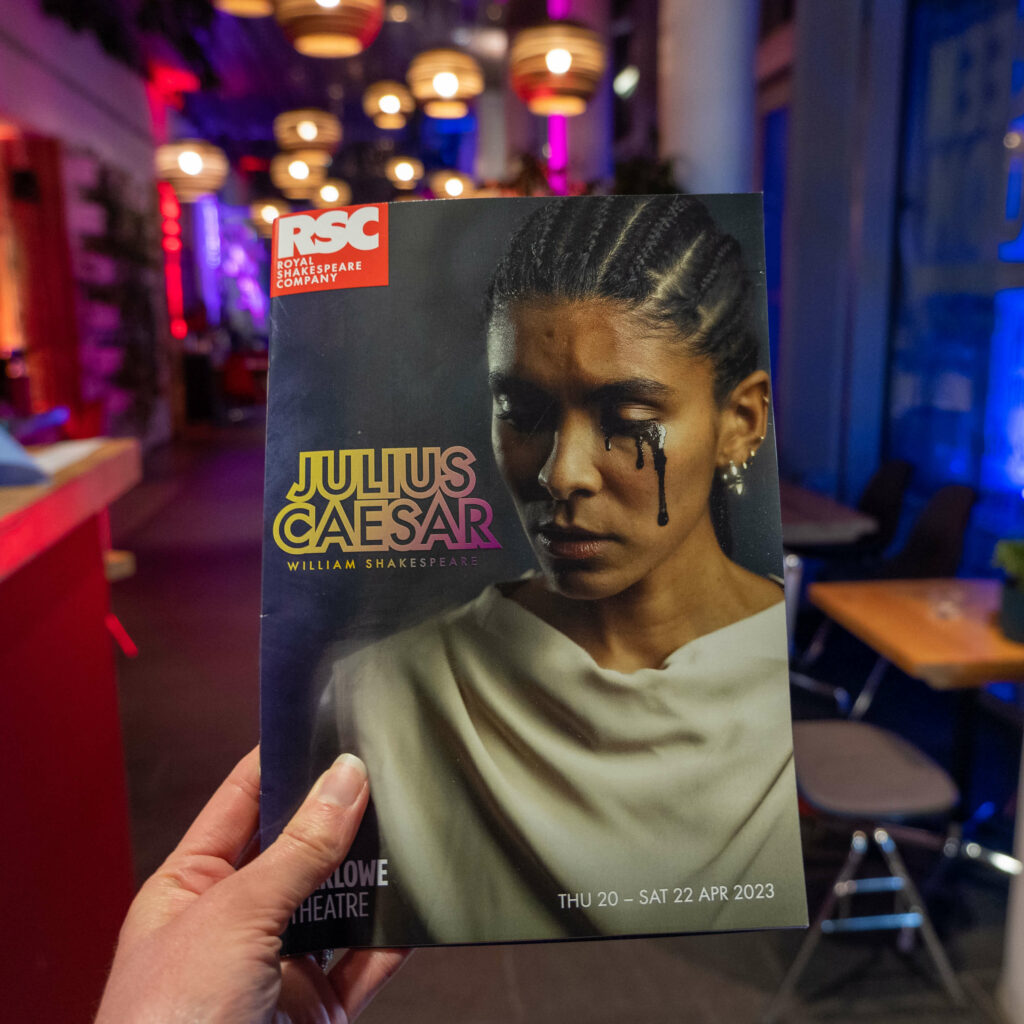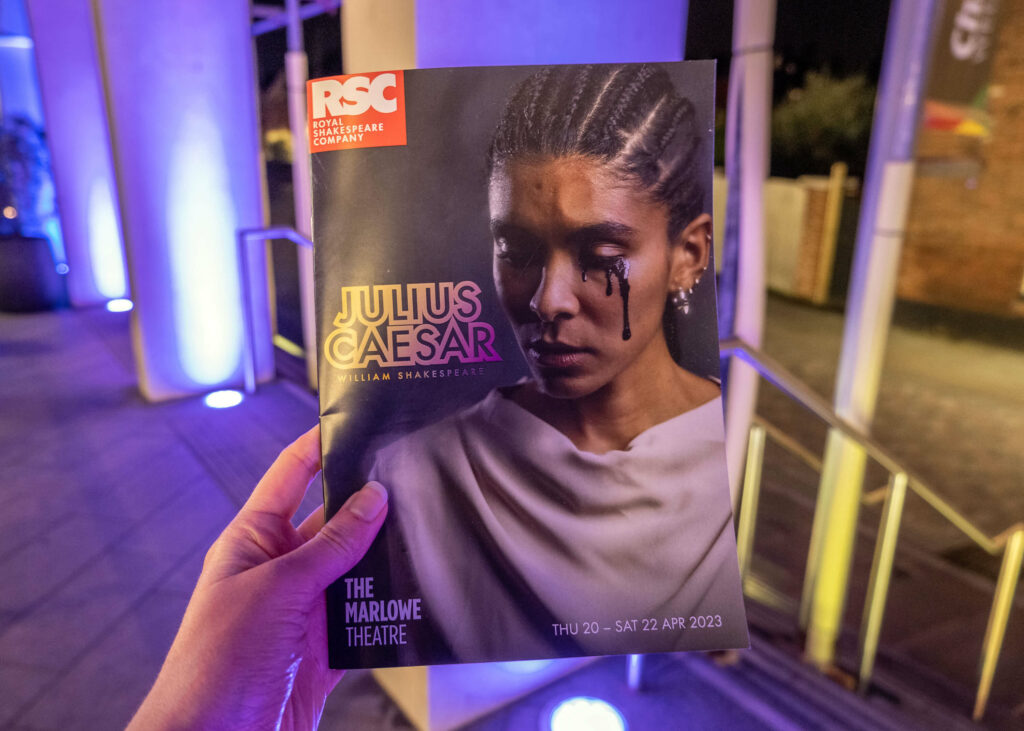[AD – PR invite*]
★★★★
When I think of British theatre, Shakespeare almost instantly comes to mind. Growing up I didn’t have much of an exposure to the playwright’s catalogue of writing, but as an adult and avid theatre fan, I have been fortunate enough to see a couple of his plays live on stage. Back in 2020 the RSC’s (Royal Shakespeare Company) touring production of ‘Measure For Measure’ really stuck with me, with its moral questioning story and memorable mirrored set. You can therefore imagine my interest when I heard that the company would be opening their 2023 tour of ‘Julius Caesar‘ in my local city, spearheaded by director Atri Banerjee. Banerjee was included in The Stage’s ‘25 theatre makers to watch in 2022’ and with such a reputable creative at the helm, I was keen to see how the director would make his mark on one of Shakespeare’s classics. I felt very fortunate to be in the audience at The Marlowe Theatre on press night, watching Julius Caesar reimagined for the 21st century.

A modern day interpretation
Julius Caesar died in 44 BC and with the modern day architecture in the sets and use of technology and videography throughout the show, Banerjee’s version appears to take place in the present day. This can also be seen in the costumes, where the principal characters are unassuming in their everyday outfits.
If it wasn’t for the careful positioning of the actors on stage in assembly fashion, you would hardly believe that the principal characters are influential citizens of the empire. The lack of ceremony makes it difficult to appreciate who holds the most power within Roman society, but it does help challenge the theme of influence within the piece of theatre, highlighting that power can come from anywhere.

Sets and use of technology
Rosanna Vize’s sets are futuristic and rely heavily on the use of technology, starting with the rotating cube at the centre of the stage. Whilst I have not seen a classic interpretation of Julius Caesar to make a clear comparison, the use of digital imagery and geometric set design feels a little out of place to the wider subject of the piece. I appreciate the steps that the creative team have taken to turn the source material into a timeless thriller, but most of the plot in the second half of the production is implied rather than visually conveyed and with these contemporary sets, it is difficult to visualise the civil war conflict and revolts.
In contrast, the use of pre-recorded video really works in Caesar’s funeral scene. Without giving too much away, it provides a different viewpoint to the deceased ruler, making sure Caesar’s body and form live on as the political landscape changes.

Use of music
This adaptation of Shakespeare’s work features several sequences of collaborative movement to music. An intriguing opener to the show, the performers move as one and build tension through their collective motions. These gestures lack the sharpness of dance theatre, but the actions are powerful as a unit.
However, the music is not isolated to group choreography. Early in the production the repetitive sounds act as a metaphor for the crowds of Rome, chanting for Caesar whilst the conspirators plot to murder him. The additional noise definitely helps recreate the enormity of the Roman empire, but there were moments where the actors felt overpowered by the backing.

Standout performances
Language is arguably the most important part of Shakespeare’s work and despite all of the changes, dialogue remains at the heart of the production. You could have heard a pin drop in the auditorium during the heated exchanges and monologues, most notably between Brutus (Thalissa Teixeira) and Cassius (Annabel Baldwin, the role is primarily played by Kelly Gough). Thalissa and Annabel are a fantastic partnership on stage, particularly during their early discussions about Caesar and the fall of the conspirators in the second act.
In addition, Mark Anthony (William Robinson) bares his soul to the people of Rome at Julius Caesar’s funeral. The speech is powerfully roared across the auditorium and you can easily imagine the impact that these words would have on Caesar’s supporters.

Empowering use of British Sign Language
I was extremely inspired by the conscientious approach to accessibility and inclusion within the production. A British Sign Language (BSL) interpreter is in costume and part of the action, moving with the performers and imitating their emotions and movements. It is such an innovative way to include BSL within the performance, but also bring an equitable level of emotion to the performance for deaf members of the audience.
The role of Lucius is played by Jamal Ajala and the actor is involved in a series of emotional exchanges with Brutus. As a deaf performer, Jamal signs their lines and Thalissa replies in both spoken word and BSL. It is touching how much you can understand from these conversations, even as somebody who does not have knowledge of BSL. I look forward to seeing this more in the future, as sign language plays a greater role in theatrical productions.

An innovative take on Shakespeare’s work
Banerjee has clearly taken the source material and made Julius Caesar his own. It is definitely a harrowing interpretation of Shakespeare’s work and with the talent of the RSC members, the play is packed full of drama, passion and mystery.
Whilst it is inspired and futuristic, the production is a metaphoric interpretation of the original story and it requires a great amount of thought to appreciate the creative decisions. If you are new to live adaptations of the writer’s work, I would suggest starting with a more literal interpretation of a Shakespearean classic first of all and then look to Banerjee’s Julius Caesar as a contrasting perspective. This creative and unique adaptation of Julius Caesar is at The Marlowe Theatre until Saturday, before moving onto its next touring location. Last minute tickets for the final performance in Kent can be purchased from the theatre’s website.
Thanks for reading my blog today.
Love Kat xxxx
*My ticket and programme for Julius Caesar were gifted in exchange for a review of the production.

Comments